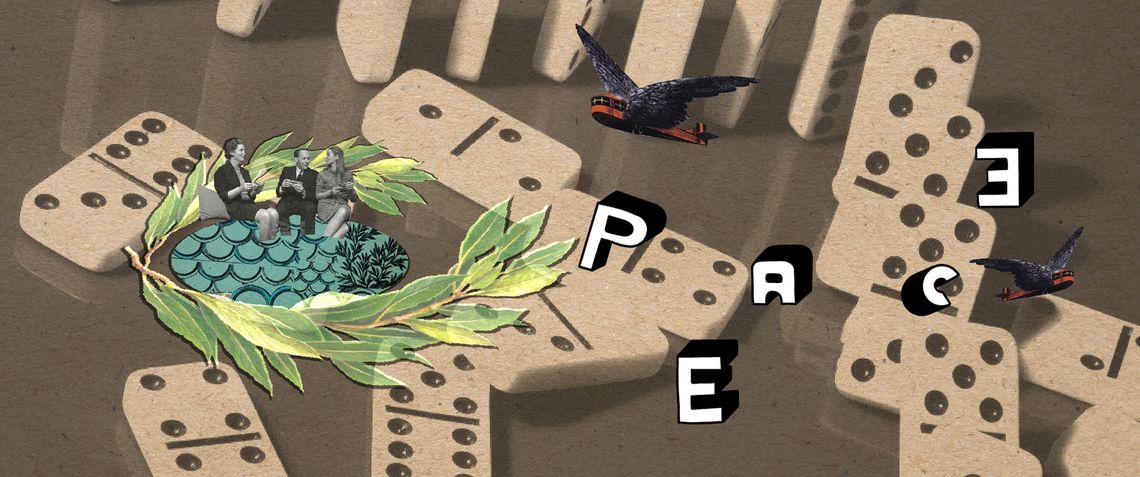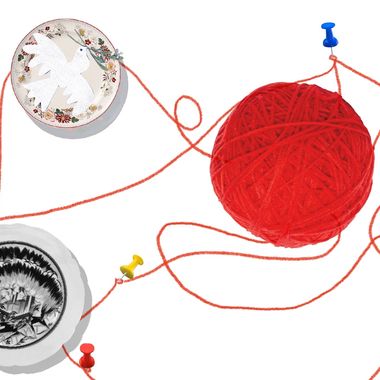Tue Jan 12 2021 · 8 min read
Azerbaijan’s Breach of the Peace and the Indifference of World Powers

By Zaven Sargsian

Illustration by Armine Shahbazyan.
Since the end of WWII, the world has been more peaceful than at any other time in history. During WWII, an estimated 75 million people perished, including about 20 million Soviets, 6 million Jews, 420,000 Americans, 450,000 Brits and 492,000 Italians. Just stop and think about those numbers. No conflict since WWII has come close to claiming as many lives.
It is among this backdrop of remarkable peace that most people, including myself, have never been mobilized for war or participated in an armed conflict. Although peace is a benefit in its own right, it has also given us an unbelievably more prosperous world than that of our predecessors. Peace has been a necessary ingredient to our progress.
This peace, however, did not miraculously come into existence. Humanity did not suddenly evolve after WWII. Humans are still capable of violence on a massive scale. Rather, the relative peace we have enjoyed is due in large part to the efforts of the world powers.
After the end of WWII, and the unspeakable horrors it brought with it, the world powers realized a new order was necessary to ensure global peace. The old order, of constant and unabated war in Europe, was intolerable. Thus, even though the League of Nations—the precursor to the United Nations—was a failure, in October 1945, representatives of 50 countries met in the United States to draw up the United Nations Charter, which would set out rights and obligations of countries based on certain fundamental principles agreeable to all.
Thus, the first article of the Charter states in part that the purpose of the UN is “[t]o maintain international peace and security,” and to that end the world would “take effective collective measures… to bring about by peaceful means… settlement of international disputes or situations which might lead to a breach of the peace.” In pursuit of this purpose, all members are required to “settle their international disputes by peaceful means in such a manner that international peace and security, and justice, are not endangered.”
In other words, although we accepted the reality that nations would continue to have conflicts, our response was that conflicts must be settled peacefully. In a world with complex alliances and destructive weapons on a terrifying scale, war could no longer be the answer. Peace had to prevail; otherwise, local conflicts could grow into regional conflicts—triggering alliances—that might then grow into another world conflict, likely the last one of our species.
So important was the principle of peaceful settlement of disputes that it was stated in The North Atlantic Treaty in 1949, as well as in the 1975 Helsinki Final Act, also known as the Helsinki Accords, which included as signatories all of Europe, the Soviet Union and the United States.
Our collective agreement to resolve conflicts peacefully has served us well since. It is true, we have at times deviated; the 2003 invasion of Iraq—despite protests from the UN—was certainly considered a low point by many. But more often, peace has prevailed. Most frozen conflicts around the world—for example, Taiwan and Kashmir—are in some stage of peace negotiations.
Yet, with all the work that we’ve put in, the world powers’ careless or, in Russia’s case, opportunistic stance toward the recent Karabakh conflict may be setting another awful precedent for world peace.
Starting in 1994, after a ceasefire was signed between Armenia, Azerbaijan and the Nagorno-Karabakh authorities, peace negotiations began in earnest. While peace negotiations were not ultimately fruitful, there was notable progress made over the years toward an ultimate settlement of the conflict. In February 2015, the then OSCE Minsk Group U.S. Co-Chair James Warlick commented in an interview that “what is remarkable [about the Karabakh conflict] is that the sides are actually very close.” This all, however, ended on September 27, 2020, when after months of silent planning, the Azerbaijani military began an early morning air and ground invasion of Karabakh.
The fact that Azerbaijan initiated the war is undisputable. As early as May 14, 2020, Azerbaijan’s Defense Ministry released information describing large-scale military exercises that would take place from May 18 to 22. The exercises were expected to include 10,000 servicemen, 120 artillery and armored vehicles, 200 missile systems, 30 aviation units and various unmanned aerial vehicles.
The scale and offensive nature of the exercises were so significant that they caused alarm among officials, including in the U.S., where several congressional representatives sent a letter to Secretary of State Mike Pompeo and Secretary of Defense Mark Esper voicing their concern.
The military exercises were followed by increased momentum in Turkish-Azerbaijani military cooperation. On May 31, Azerbaijan’s National Assembly approved an agreement which involved military cooperation with Turkey, including an agreement to purchase products and services from Turkish defense industry companies. Azerbaijan’s Defense Minister, Zakir Hasanov, unabashedly announced on June 22 that Azerbaijan was planning to acquire scores of Turkish-made drones.
Soon after Hasanov’s announcement, Aliyev gave his infamous July 6 speech, which was filled with anti-Armenian invective—including a reference to Armenia as a “country of criminals, thieves and bribe-takers”—and frustration at the OSCE mediation process. Aliyev railed at the OSCE. “What is the main thesis of [the OSCE’s] statement? A military option is impossible? Who said that? Open the UN Charter and see if countries have the right to self-defense or not! Who do you think you are?!… After all, there is a limit to everything.”
A former U.S. ambassador to Azerbaijan described Aliyev’s remarks as a “[v]ery ominous statement” and “hint[ing] at [the] military option.” One week later, fighting broke out between Armenia and Azerbaijan in the northern Tavush region. While the fighting only lasted several days, it left 16 killed on both sides—including two senior Azerbaijani officers, Major-General Polad Hashimov and Colonel Ilgar Mirzayev.
Turkish officials were quick to blame Armenia for the July fighting. Turkish Foreign Minister Melvut Cavusoglu called on Armenia to “pull its head together” and stated that Turkey stands with Azerbaijan “with all it has.” Turkish Defense Minister Hulusi Akar announced that “Armenia will definitely pay for what they have done.” And on July 17, Ismail Demir, Turkey’s head of the Presidency of Defense Industries, stated that Turkey’s “armed unmanned aerial vehicles, ammunition and missiles with our experience, technology and capabilities are at Azerbaijan’s service.”
These were not idle threats. According to the Turkish Exporters’ Assembly, Azerbaijan bought $123 million in defense aviation equipment from Turkey in the first nine months of 2020—of that amount, $278,800 was in July, $36 million in August and $77.1 million in September. For comparison, Turkey’s military sales to Azerbaijan totaled only $20.7 million for all of 2019.
Only a couple weeks after Demir’s July 17 statement, Azerbaijan and Turkey announced they would be holding “Live Fire Joint Large-Scale Tactical and Flight-Tactical Exercises… with the participation of the Land Forces and Air Forces of both countries.” As part of the exercises, which were held in August, Turkish F-16 fighter jets were transported to Azerbaijan.
By August, evidence of Azerbaijan’s war plan was overwhelming; by September, the fact became irrefutable. As early as September 2, news reports were published about Turkey transporting Syrian terrorists to the Caucasus. Russian media outlet Nezavisimaya published an article on September 2 entitled “Syrian fighters in Azerbaijan prepare for blitzkrieg into Armenia,” and stated that “around 500 Syrian fighters ha[d] been moved to Azerbaijan…” According to the Syrian Observatory for Human Rights (SOHR), roughly 2,580 Syrian terrorists were transported by Turkey to Azerbaijan.
Azerbaijan equipped and armed these fighters, and by some accounts, provided them pickup trucks confiscated from Azerbaijani civilians. In fact, starting on September 21, less than a week before the start of the war, several Azerbaijan citizens reported that traffic police were confiscating their pickups for use by the military. On September 22, Azerbaijan’s Main Directorate of the State Traffic Police confirmed these reports, stating that such pickups and other special-purpose vehicles may be necessary for use by the armed forces.
Finally, only days before September 27, Aliyev gave an interview with local TV channels where he stated: “we will definitely return to our lands. Nagorno-Karabakh is our ancient historical land, and we will definitely return to these lands… Karabakh is ours, Karabakh is Azerbaijan!”
Early in the morning, on Saturday, September 27, the 2020 Artsakh War began.
Based just on the above public record—not to speak of government intelligence—it is undeniable that Azerbaijan premeditated this war. Yet, despite the evidence, the response from the world powers has been muted, which raises the question: what precedent are the world powers setting if they allow Azerbaijan to resolve its dispute through war in breach of the principle of peaceful settlement?
This is certainly not the first violation of the international order. In fact, many of the world powers that worked to establish the UN Charter have themselves been accused of violating it. American airstrikes in Syria are of questionable legality. And recently, Russia annexed Crimea in what was seen by many as the first time since WWII that one nation seized the territory of another.
However, to declare that these past violations license or excuse Azerbaijan’s current violation, means we have to live with potentially terrifying consequences. What happens, for example, when leaders of countries involved in frozen conflicts, such as Kashmir or Taiwan, believe that resolving their dispute through war, rather than through peaceful negotiations, will be met with inaction from a discredited world community? A conflict between India and Pakistan, both nuclear powers, or China and Taiwan could have disastrous consequences for the world, both economically and in lives lost.
Instead, these prior violations, rather than being a license for future violations, should cause us to demand that the world powers redouble their efforts to peacefully settle international disputes. One way to start is for the Minsk Group Co-Chairs countries, the U.S, Russia, and France, to demand that Azerbaijan return to the negotiating table.
If they fail to do so, Karabakh may be one of many dominoes to fall. Living in the most peaceful time in human history is a fragile accomplishment that we cannot afford to take for granted.
New on EVN Report
EU Adopts New Powerful Tool to Punish Global Human Rights Violations
By Anna Barseghyan
In December 2020, the EU passed the Action Plan on Human Rights and Democracy, equipping its foreign policy arsenal with a powerful new tool to protect human rights. Armenians should be paying close attention to how it will be used.
Postmortem of a Catastrophe
By Nerses Kopalyan
Will the formation of a Truth Commission on the 2020 Artsakh War make it possible to rectify persistent and systemic errors that led to such military and geopolitical failures?
Short to Mid-term Steps for Post-War Armenia
By Artin DerSimonian
Armenia can either unify around a shared vision for the future or digress into internal political strife. Artin DerSimonian explores what a unified Armenian vision for the future could include if the country is to continue on the path of healthy socio-economic development.
Observations on Armenia’s Current Socio-Political Situation
By Hovsep Kanadyan
A concerted effort is needed to overcome the crisis the Armenian nation is facing. To do that, we need to understand where we are now, be honest, admit mistakes, learn lessons and move forward, writes Hovsep Kanadyan.
Chez moi
By Lusine Hovhannesyan
In this new essay for the “True But Not Real” creative writing series, writer and journalist Lusine Hovhannisyan explores the love Armenians have for their homes especially in the context of the recent war in Artsakh: “We love our houses with the skill of a person who has lost their home.”
2020: Battling Many Fronts
EVN Report looks back at a year that forced the Armenian people to battle multiple fronts, from the COVID-19 pandemic to a 44-day war launched by Azerbaijan that resulted in devastating human and territorial losses.








